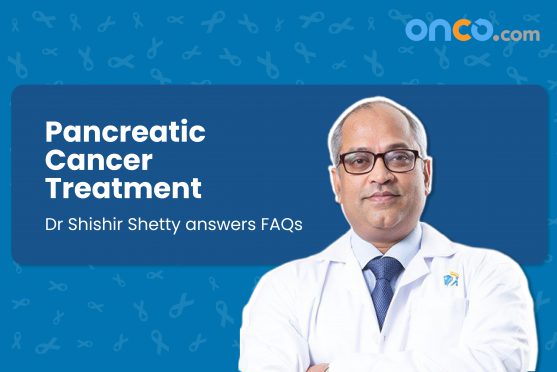Dr Shishir Shetty is a surgical oncologist with over 16 years of experience. He has treated innumerable cancer patients, particular for head and neck, as well as pancreatic cancers. He currently works at Apollo Hospitals, Navi Mumbai.

Pancreatic cancer is the fifth most common type of cancer in India. It’s not as common in India as it is in some of the western countries like the US. However, its incidence is increasing.
The pancreas is located below the stomach. It produces pancreatic juices that reach the food through the duodenum. In this way it helps in the digestion of food.
Pancreas is very important not just for digestion but also for sugar control. Diabetes is a disease related to the pancreas.
Pancreas is divided into three parts: head, body and tail. Most cancers occur in the head of the pancreas.
What are the most common symptoms of pancreatic cancer?
Jaundice is a common symptom of pancreatic cancer. Obstructive jaundice is when there is some blockage in the pancreas because of which the bile doesn’t follow freely.
Non-obstructive jaundice can be due to infections like hepatitis A. This does not usually relate to pancreatic cancer.
Obstructive jaundice can be caused due to a stone or due to cancer that blocks the routine flow of bile juices in to the intestines leading to their release in to blood stream due to back pressure.
In advanced stages, there might be pain. Sometimes, patients complain of itchiness on the skin. This is because the bile gets collected in the blood, causing such itching.
The urine becomes dark in colour.
How is pancreatic cancer diagnosed or screened?
Normally, we do not screen healthy individuals for pancreatic cancer, unless they are in the high risk category or there is some reason for screening.
A simple ultrasound of the abdomen can detect an anomaly in the pancreas.
How do you treat pancreatic cancer?
The most important treatment for pancreatic cancer is surgery. It is the best form of treatment.
If surgery is not possible, then we might give chemotherapy. There are two types of chemotherapy that are used in such a situation.
- Palliative chemotherapy: This is given when the disease has become so advanced that treatment is aiming to reduce the symptoms and relieve pain, rather than curing the disease.
- Neoadjuvant chemotherapy: This is used to reduce the size of the tumour before you can perform surgery to remove it.
Adjuvant chemotherapy is given after surgery to kill any remaining cancer cells that may have been left behind.
What is palliative surgery?
Generally, surgery is done to ‘cure’ the problem. Sometimes, surgery cannot solve the problem, so we try to bypass the problem.
If something is clogging the passageway in the pancreas, we try to bypass that area. We might do a double or triple bypass to create separate passages for bile and food.
This can be done with minimal intervention as well.
Do vitamin supplements play a role in pancreatic cancer?
It is not true that vitamins prevent cancer. A healthy lifestyle, good exercise, good sleep and less stress can help you prevent cancer.
What role does genetics play in pancreatic cancer?
Genetics plays a minor role. In cases of vipomas, and insulinomas, genetics plays a role. But these are rare types of cancers.
Like in all types of cancers, smoking is the most preventable cause of pancreatic cancer as well.
In most cases, we cannot pinpoint the exact cause for the cancer.
You can learn more about pancreatic cancer here.

